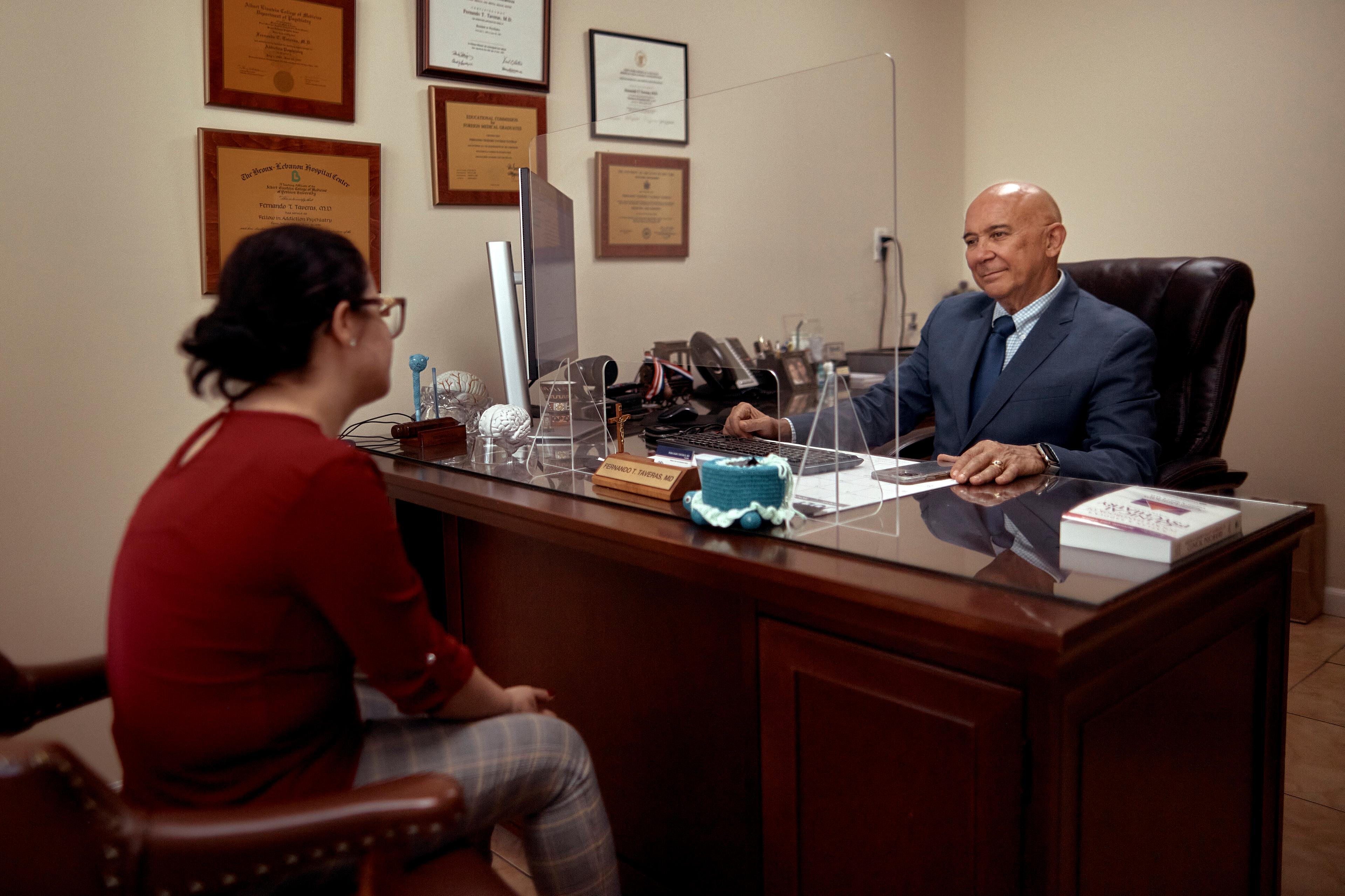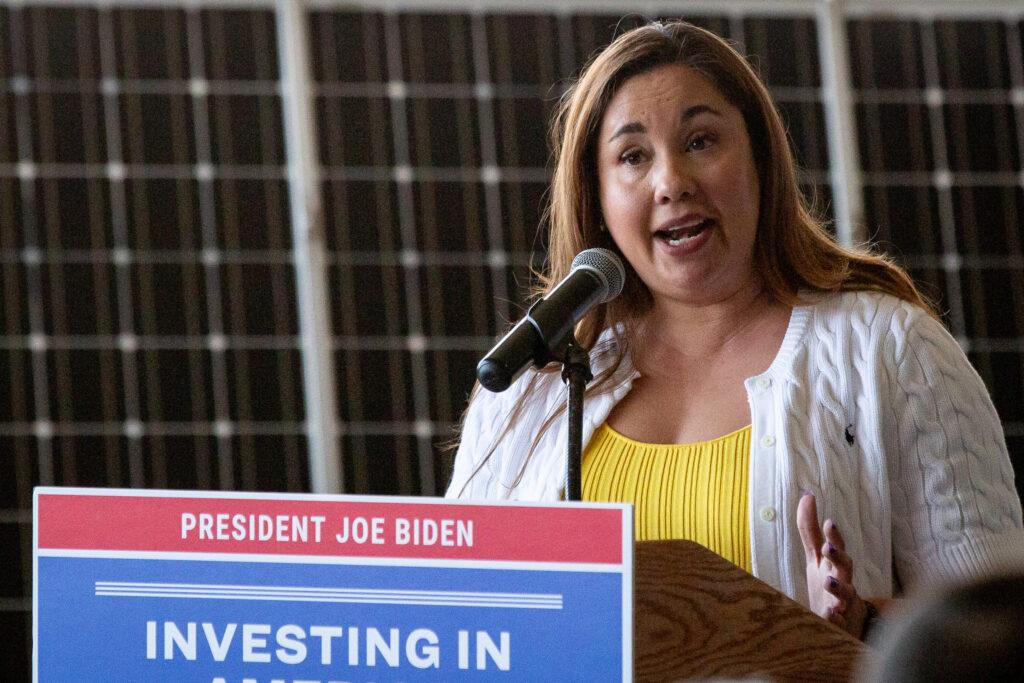
By Fernanda Figueroa/AP
Michelle Mata wasn’t diagnosed with a mental illness until she was 23, after years of suffering. She knew very little about who to ask for help, having grown up in a Latino family in San Antonio that didn’t talk about mental health. At appointments, she was terrified of telling the truth.
“I didn’t want to tell (doctors) that because I knew that as soon as I disclosed what I was feeling my freedom was going to be taken away from me and I was going to be put into the hospital,” said Mata, 53, who talked about her mental health to The Associated Press in the hope of helping others. She now works at the San Antonio chapter of the National Alliance on Mental Illness as she copes 30 years later with depression and post-traumatic stress disorder.
The 2022 National Survey on Drug Use and Health showed that just over one-fifth of Hispanic adults reported having a mental illness, defined in the report as a diagnosed mental, behavioral or emotional disorder that may have interfered with their lives. That's slightly less than white Americans (24.6 percent) but more than Black Americans (19.7 percent) and Asian Americans (16.8 percent).
The same survey showed Hispanic adults were less likely to receive treatment than multiracial adults and white adults. Mental health experts, community clinics and politicians are increasingly calling attention to barriers Latinos might face in seeking treatment — like the lack of mental health professionals who are Latino and speak Spanish or other languages — and working to create new programs to address access issues.
“The more we talk about it and we hear it and we understand it we can do something about it,” said Mata, who is hopeful that younger generations won't have to struggle like she did. “People don’t understand asking for help is not a sign of weakness. Asking for help is something courageous.”
SOMOS Community Care in New York City started doing mental health screenings for all patients regardless of the reason for the appointment, said Riquelmy Lamour, the director of behavioral health and social work.
Many of the patients live in heavily Latino neighborhoods in upper Manhattan and the South Bronx, and Lamour said that it can be easier for someone to lower their guard when a doctor who’s been treating the family for generations sets them up with a mental health professional. The organization also conducts screenings at street fairs, providing an immediate connection to a provider and resources to find other appropriate services.
“You go to a doctor but a doctor that looks like you, that speaks like you, that understands your culture, your language, the nuances," she said.
An American Psychological Association interactive tool shows about 8 percent of psychologists identified as Latino in 2021, the most recent data available. Dr. Julia Macedo, a psychiatrist in Pittsburgh and a fellow with the National Hispanic Medical Association, said patients are less likely to seek help if they don’t have someone who can understand their experiences, such as the anxiety and fear of having a family member deported.
The national suicide and crisis hotline, 988, offers voice, text and chat services in Spanish. Congressional Democrats have put forth two bills that would help with education and outreach around mental health for Latinos. One introduced in the Senate in 2023 hasn't received a committee hearing. The other, introduced in May by Colorado Rep. Yadira Caraveo, focuses specifically on young Latinos.

The 2022 federal survey showed 1.2 million Hispanic people ages 12 to 17 suffered a major depressive episode but only half received mental health treatment. Talking about mental health in schools as early as kindergarten would help young Latinos understand that “(mental health) is not bad, it is just an illness," said SOMOS psychiatrist Dr. Fernando Taveras.
Oregon Rep. Andrea Salinas is a cosponsor on the recent bill, which hasn't gotten a committee hearing yet. She said she grew up in a Latino household where mental health was not spoken about, and said it's vital for Latino youth to have the resources they need.
“It’s about giving people hope and letting them know that even though we may not be able to pass something right now people are listening," she said. "I feel like that alone can hopefully save a life or encourage someone to ask for help.”
Servicios de la Raza is one of the few behavioral health centers in Colorado that has a diverse Spanish-speaking staff and resources in Spanish. Doctors around the state refer people to the organization, which started in 1972 with mental health as a focus, said Ana Belen Vizoso, vice president of health and wellness. The organization sees about 10,000 patients a year for mental health services, but she said the needs are constantly growing for a community that makes up nearly 19 percent of the state's population.
Vizoso said the stigma around seeking mental health help in the Latino community still exists, but there's been a shift. Her organization has seen more people looking to get care, but asking for help and getting help are two different things, she added.
“It is the first time a lot of individuals open up and share about their experiences in a behavioral health setting,” Vizoso said that patients have written in exit surveys. “If they did not have access to our services, they would not have the opportunity to. Everyone in our community should have access but that is not the case for everybody.”
The Department of Mental Health in Los Angeles County, California, started expanding mental health care services for the county's 4.8 million Latinos during the pandemic. That included the creation of the speaker’s bureau, where licensed clinicians provided reliable information on COVID-19 and now give “clinically, culturally and linguistically” appropriate information about mental health and other topics, said Sandra Chang, who is the program manager for the county's mental health clinical program.
The county also started Promotores de Salud (Mental Health Promoters), a peer-to-peer hub that provides mental health information; a 10-week program focused on empowering Latinas; and an effort using the Mayan community's traditional forms of healing.
The support groups are making a difference based on the feedback Chang said she has received, adding that people are learning “to seek out goals and focus on their personal needs, discovering themselves for the first time in terms of admiring themselves, finding their self-worth, being able to speak of their needs openly, not being afraid of asking for help, fighting the stigma.”









